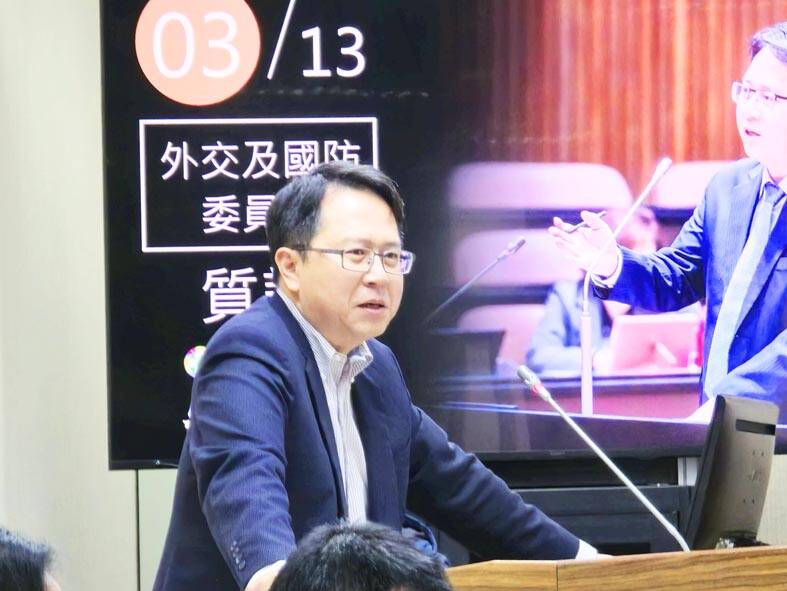A Democratic Progressive Party (DPP) lawmaker yesterday proposed an amendment that would impose fines on Taiwanese who work with Chinese political groups to undermine national dignity, in response to recent cases of online influencers posting pro-China content.
Legislator Chiu Chih-wei’s (邱志偉) proposed amendment to the Act Governing Relations Between the People of the Taiwan Area and the Mainland Area (臺灣地區與大陸地區人民關係條例) would fine people NT$50,000 for collaborating with groups affiliated with the Chinese Communist Party (CCP) to publish content that threatens Taiwan’s existence or seeks to overthrow its democratic freedoms.
Current regulations are too broad and only impose penalties for collaborating with the CCP, Chiu said, adding that Taiwanese who travel to China are restricted from subverting national security, but can “echo” CCP propaganda.

Photo: Fang Wei-li, Taipei Times
His proposed amendment would clarify what type of behavior is off-limits for those who travel to China, including cooperating with political, military or administrative units that threaten Taiwan’s existence.
Advocating to overthrow or change Taiwan’s democratic Constitution would also be restricted, he added.
The penalties stipulated in Article 91 of the act, which currently start below NT$10,000, must also be increased to bolster deterrence, he said.
The penalties should be applied for each contravention of the law to avoid ambiguity or evasion of punishment, he added.
Several other lawmakers also support the amendment, Chiu said, adding that a draft has already been sent to the Legislative Yuan.
Clearer laws are easier to follow, Chiu said, adding that Taiwan must reaffirm its sovereignty and not allow China to take advantage of any opportunity to endanger the country and its government.

The manufacture of the remaining 28 M1A2T Abrams tanks Taiwan purchased from the US has recently been completed, and they are expected to be delivered within the next one to two months, a source said yesterday. The Ministry of National Defense is arranging cargo ships to transport the tanks to Taiwan as soon as possible, said the source, who is familiar with the matter. The estimated arrival time ranges from late this month to early next month, the source said. The 28 Abrams tanks make up the third and final batch of a total of 108 tanks, valued at about NT$40.5 billion

Two Taiwanese prosecutors were questioned by Chinese security personnel at their hotel during a trip to China’s Henan Province this month, the Mainland Affairs Council (MAC) said yesterday. The officers had personal information on the prosecutors, including “when they were assigned to their posts, their work locations and job titles,” MAC Deputy Minister and spokesman Liang Wen-chieh (梁文傑) said. On top of asking about their agencies and positions, the officers also questioned the prosecutors about the Cross-Strait Joint Crime-Fighting and Judicial Mutual Assistance Agreement, a pact that serves as the framework for Taiwan-China cooperation on combating crime and providing judicial assistance, Liang

A group from the Taiwanese Designers in Australia association yesterday represented Taiwan at the Midsumma Pride March in Melbourne. The march, held in the St. Kilda suburb, is the city’s largest LGBTQIA+ parade and the flagship event of the annual Midsumma Festival. It attracted more than 45,000 spectators who supported the 400 groups and 10,000 marchers that participated this year, the association said. Taiwanese Designers said they organized a team to march for Taiwan this year, joining politicians, government agencies, professionals and community organizations in showing support for LGBTQIA+ people and diverse communities. As the first country in Asia to legalize same-sex

MOTIVES QUESTIONED The PLA considers Xi’s policies toward Taiwan to be driven by personal considerations rather than military assessment, the Epoch Times reports Chinese President Xi Jinping’s (習近平) latest purge of the Chinese People’s Liberation Army (PLA) leadership might have been prompted by the military’s opposition to plans of invading Taiwan, the Epoch Times said. The Chinese military opposes waging war against Taiwan by a large consensus, putting it at odds with Xi’s vision, the Falun Gong-affiliated daily said in a report on Thursday, citing anonymous sources with insight into the PLA’s inner workings. The opposition is not the opinion of a few generals, but a widely shared view among the PLA cadre, the Epoch Times cited them as saying. “Chinese forces know full well that